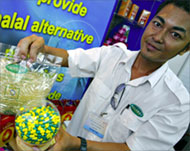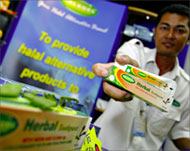Malaysia looking to all things halal
Malaysian manufacturers are cashing in on the concept that virtually all goods and services can be certified halal, including cosmetics, clothing, pharmaceuticals, financial services and even tour packages.

Halal shoes, meat and other foodstuffs have long been staples of households in the Muslim world. But now halal toothpaste, face cream, floor cleaner, paint brushes and beauty products have also made an appearance.
Booming industry
A glimpse in Nora Rosely’s make-up bag is an insight into a booming industry that Malaysian trade officials say is potentially worth $560 billion a year worldwide.
The collection includes facial creams, skin toners, lipsticks, cosmetic applicators and perfume – and all the items are certified halal, or permitted under Islam.
“It started when I went overseas when I was 18. I became more aware of what halal means and what to eat and not to eat, so I checked labels and ingredients,” Nora says.
“Back home in Malaysia you take for granted that everything is halal.”
Consumers
The 38-year-old teacher is one of a growing number of consumers in Malaysia and worldwide who have the will, and the money, to ensure that as many of the products in their home as possible are halal.
 |
|
Halal-certified gelatine capsules |
“My husband is quite particular. He was prescribed with medication that said the gelatine capsule was from a bovine source. Although it’s from beef, for us, halal means it has to be slaughtered by a Muslim, so he emailed the manufacturer to ask,” says Nora, adding they are still waiting for a reply.
The concept of halal – meaning “permissible” in Arabic – has traditionally been applied to food. Pork and its by-products, alcohol and animals not slaughtered according to Quranic procedures are all “haram” or forbidden.
Growing market
Malaysia believes the market is currently worth $150 billion annually, but could expand almost fourfold based on an estimated 1.8 billion Muslims worldwide each spending 85 cents on food every day.
The opportunity has Malaysia, a predominantly Muslim country with sizeable Chinese and Indian minorities, scrambling to be part of what Prime Minister Abdullah Ahmad Badawi has called a “new global market force”.
Its bid to market itself as a global centre for the manufacture and export of halal products is being promoted by a government which advocates a moderate version of Islam that emphasises economic and scientific progress.
Production zones
Halal food production zones are already operating or being built in six Malaysian states, and a sprawling halal distribution hub has been built at a duty-free transhipment zone in southern Johor state, on the busy Malacca Strait.
The facility includes a “one-stop” centre for halal certification to attract manufacturers to export from there to other Muslim markets overseas.
Malaysian communications company Kasehdia, has published what it says are the only halal food guides in the world – destinations include London, Singapore and Australia.
 |
|
Demand for halal products comes |
“All Muslims eat halal food and the majority of Muslims dress a certain way, but they’ve never been grouped as one market,” says Jumaatun Azmi from Kasehdia.
It also publishes a trade journal for the halal industry, while an English-language television show on the halal marketplace will start later this year – all attempts to promote a contemporary approach to Islam, she says.
Better choice
Halal industry insiders say the demand for their products is not due to rising fundamentalism, but simply that Muslims are more aware of religious practices and have better product choices.
“The sensitivity to non-halal products is because the consumer is more educated today,” says says Mohamad Yakob from Halagel, which makes rock salt, herbal toothpaste, and even the sought-after halal gelatine capsules.
“A Muslim might not be a pious Muslim, he might not even pray every day. But if it comes to touching a swine or he feels that he has taken a product that is non-halal, he is very sensitive about it.”